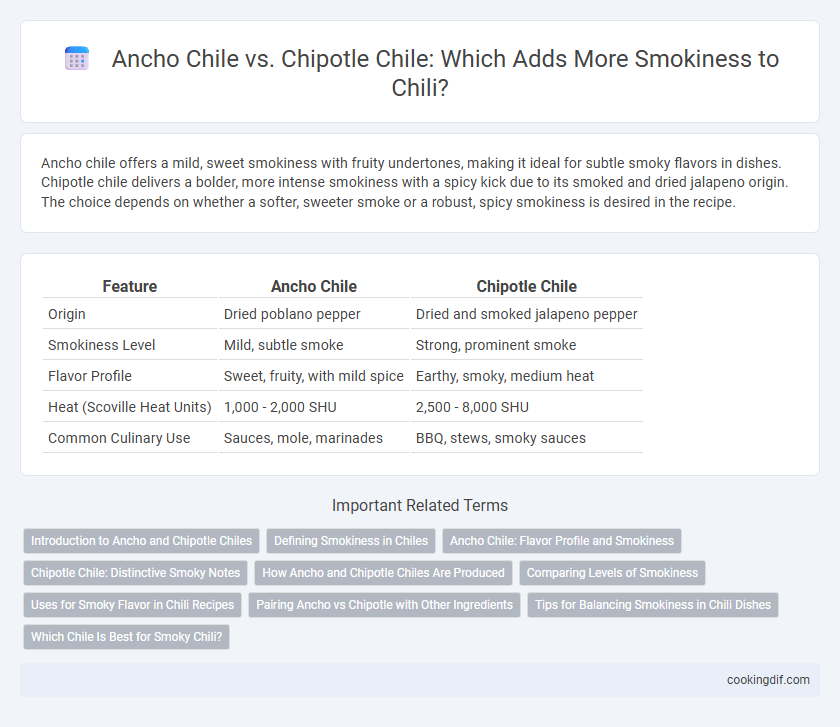Ancho chile offers a mild, sweet smokiness with fruity undertones, making it ideal for subtle smoky flavors in dishes. Chipotle chile delivers a bolder, more intense smokiness with a spicy kick due to its smoked and dried jalapeno origin. The choice depends on whether a softer, sweeter smoke or a robust, spicy smokiness is desired in the recipe.
Table of Comparison
| Feature | Ancho Chile | Chipotle Chile |
|---|---|---|
| Origin | Dried poblano pepper | Dried and smoked jalapeno pepper |
| Smokiness Level | Mild, subtle smoke | Strong, prominent smoke |
| Flavor Profile | Sweet, fruity, with mild spice | Earthy, smoky, medium heat |
| Heat (Scoville Heat Units) | 1,000 - 2,000 SHU | 2,500 - 8,000 SHU |
| Common Culinary Use | Sauces, mole, marinades | BBQ, stews, smoky sauces |
Introduction to Ancho and Chipotle Chiles
Ancho chile, the dried form of the poblano pepper, delivers mild smokiness with a rich, fruity undertone ideal for enhancing traditional Mexican dishes. Chipotle chile, made by smoking ripe jalapeno peppers, offers a pronounced smoky flavor with moderate heat, commonly used to intensify salsas and sauces. Both chiles contribute distinct smoky profiles, with ancho providing a sweeter, earthier smoke and chipotle delivering a sharper, smokier kick.
Defining Smokiness in Chiles
Ancho chile delivers a mild, sweet smokiness derived from its dried poblano pepper origins, characterized by subtle earthy undertones and a gentle heat. In contrast, chipotle chile, made from smoked and dried jalapenos, offers a pronounced, intense smoky flavor with spicy warmth, often described as rich and bold. The defining factor of smokiness in chiles lies in the drying process, where chipotles undergo direct smoking, enhancing their robust smoky profile, whereas ancho chiles drying is typically sun-based, resulting in milder smoky notes.
Ancho Chile: Flavor Profile and Smokiness
Ancho chile offers a rich, sweet, and mildly smoky flavor derived from dried poblano peppers, making it a versatile ingredient in Mexican cuisine. Its smokiness is subtle and earthy, providing depth without overpowering other spices. Compared to chipotle chile, which has a more intense, smoky, and spicy profile due to the jalapeno drying process, ancho chile delivers a gentler, nuanced smokiness ideal for sauces and mole dishes.
Chipotle Chile: Distinctive Smoky Notes
Chipotle chile offers distinctive smoky notes that come from drying ripe jalapenos over wood fires, intensifying its rich, earthy flavor profile ideal for barbecue and chili dishes. Ancho chile, derived from dried poblano peppers, provides a milder smoky taste with sweet and fruity undertones, making it less intense than chipotle in smokiness. For a bold and robust smoky flavor, chipotle chile stands out as the preferred choice in culinary applications emphasizing rich, smoky depth.
How Ancho and Chipotle Chiles Are Produced
Ancho chiles are dried poblano peppers, harvested when fully ripe and allowed to dry naturally, resulting in a mild, sweet smokiness. Chipotle chiles are jalapenos that are smoked and dried, enhancing their flavor with a deeper, more intense smoky heat. The production methods of air-drying for ancho and smoking for chipotle create distinct smoky profiles tailored to different culinary uses.
Comparing Levels of Smokiness
Ancho chile features a mild, sweet smokiness with earthy undertones, making it less intensely smoky compared to chipotle chile, which offers a stronger, more robust smoky flavor due to its drying and smoking process over wood fires. Chipotle's heightened smokiness enhances bold dishes like barbacoa and adobo, while ancho is preferred for subtle complexity in mole sauces and chili powders. Understanding these differences in smokiness levels helps chefs select the ideal chile to match flavor intensity in traditional Mexican cuisine.
Uses for Smoky Flavor in Chili Recipes
Ancho chile, derived from dried poblano peppers, offers a milder, sweet smokiness with subtle fruity undertones, ideal for adding depth to chili recipes without overpowering other flavors. Chipotle chile, made from smoked and dried jalapenos, delivers a robust, intense smoky heat that enhances chili dishes requiring a bold, smoky kick. Both chiles are essential in authentic Mexican chili cooking, used to layer smokiness, with ancho preferred for rich, earthy aroma and chipotle for pronounced smoky spice.
Pairing Ancho vs Chipotle with Other Ingredients
Ancho chiles offer a sweet, mild smokiness that pairs well with chocolate, cinnamon, and roasted vegetables, enhancing savory dishes with subtle depth. Chipotle chiles bring a bold, intense smoky heat that complements grilled meats, tomato-based sauces, and black beans, creating robust, smoky flavors. Combining ancho with sweeter ingredients balances chipotle's fiery notes, making them versatile for complex Mexican-inspired recipes.
Tips for Balancing Smokiness in Chili Dishes
Ancho chile offers a mild, sweet smokiness with fruity undertones, while chipotle chile delivers a stronger, earthy smokiness and moderate heat perfect for bold chili flavors. To balance smokiness in chili dishes, start with moderate chipotle use and enhance depth with a small amount of ancho to avoid overpowering the palate. Incorporate complementary spices like cumin and paprika alongside acidity from lime or tomatoes to harmonize and elevate the smoky profile.
Which Chile Is Best for Smoky Chili?
Ancho chile, made from dried poblano peppers, offers a sweet and mild smokiness, enhancing chili with rich, earthy undertones. Chipotle chile, a smoked and dried jalapeno, delivers a stronger, more intense smoky flavor with spicy warmth, ideal for bold chili dishes. For the deepest smoky chili, chipotle chile is best, while ancho chile suits those preferring milder smokiness with nuanced flavor.
Ancho chile vs chipotle chile for smokiness Infographic

 cookingdif.com
cookingdif.com